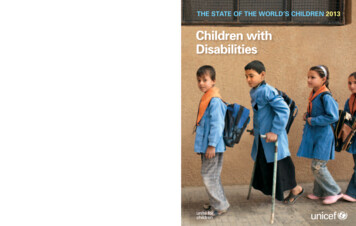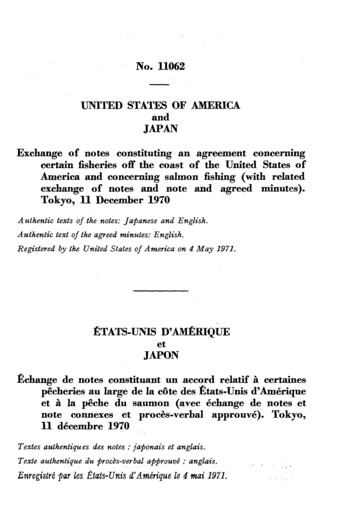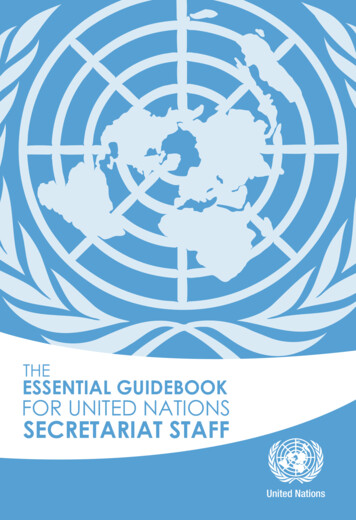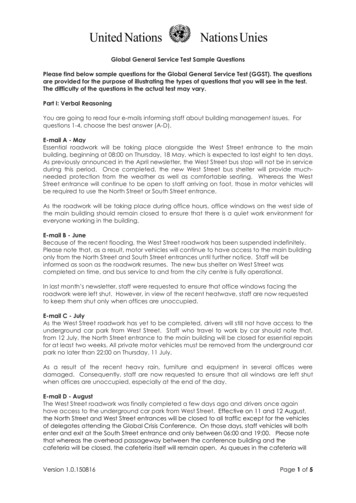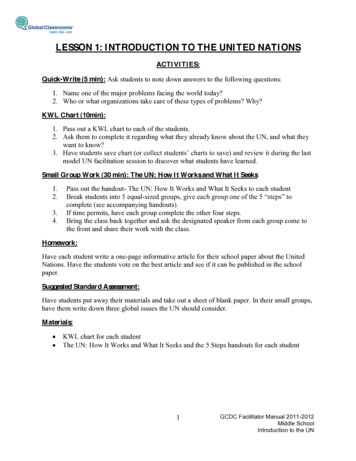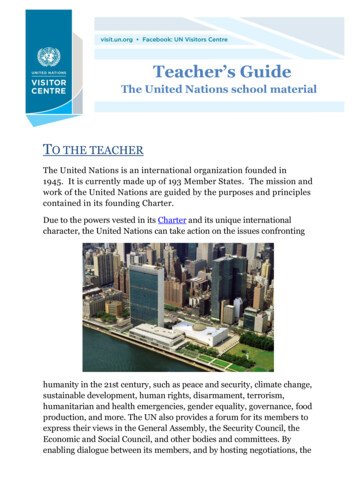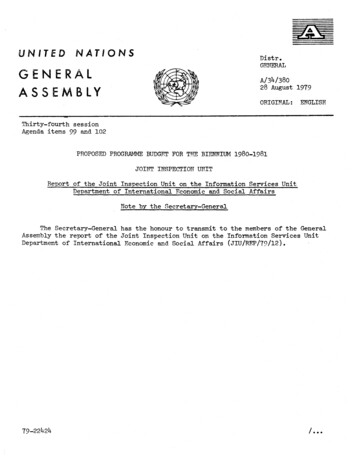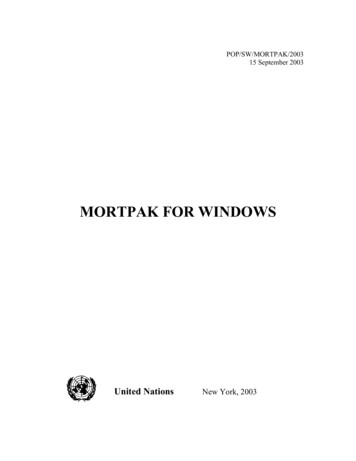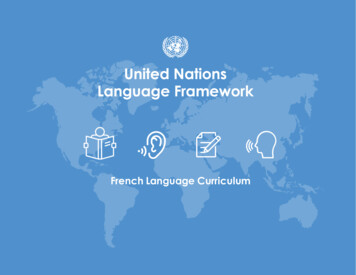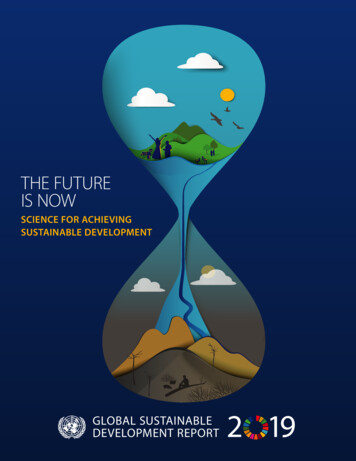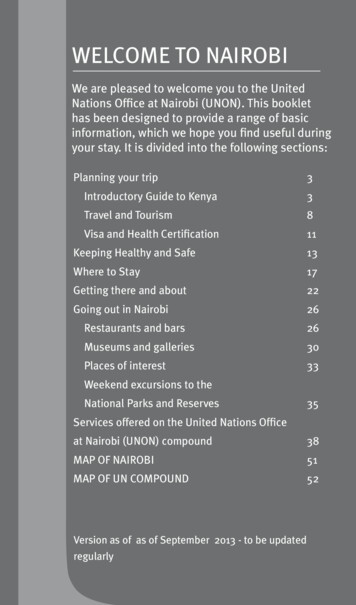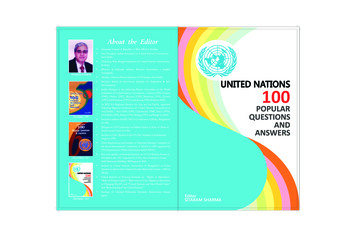
Transcription
UNITED NATIONS100POPULAR QUESTIONSANDANSWERSThird Revised Edition2012Edited by :SITARAM SHARMA11
CONTENTSPage Nos.FOREWORDKiran Mehra-KerpelmanDirector, UN Information Centre for India and BhutanPREFACEForeword for the Second Edition (2005)Preface of the Second Edition (2005)Foreword for First Edition (1995)Preface of the First Edition (1995)UNITED NATIONS 100 POPULARQUESTIONS AND ANSWERS1-15APPENDICESA. Address by the Prime Minister of India Dr. Manmohan Singhat 66th UN General AssemblyB.20C. “India And United Nations Reforms” by Mr. KrishnanSrinivasan, Former Foreign Secretary of India.25D. Selected speeches and published Articles of the Editori) United Nations at Sixtyii) Efficacy in Diversityiii) Second Syed Ahmad Hossain Memorial Lectureiv) United Nations and Civil Societyv) Global Action to Address Climate Changevi) UN Needs Restructuring283033384245E. United Nations Member States48F.51The UN Secretaries - GeneralG. Presidents of the UN General Assembly52H. United Nations Days54I.5522“UN System Under Strain” by Mr. M. K. Narayanan,Governor of West Bengal16United Nations Agencies, Logos and Websites
FOREWORDKiran Mehra - KerpelmanIt is no surprise at all that Mr. Sitaram Sharma’s United Nations : 100 Popular Questions andAnswers is getting ready for its third edition in 17 years. No surprise because the United Nationsis embraced so readily by all Indians, in this country where the opening words of the UN CharterWe the Peoples is taken very seriously.Aligned to the global thinking that the UN stands for, Indians celebrate the organization’s spiritof Vasudhaiva Kutumbakam. In India the UN is taught in schools, debated at Model UN Assembliesacross the length and breadth of this country and - in the best traditions of democracy - is bothpraised and lambasted in the vibrant media environs of India. And the vast network of UNAssociations continues to encourage public interest in the United Nations through an amazingarray of activities and campaigns. The author of this volume too has been closely associatedwith the UN Associations both at global and regional levels.While several generations of Indians have contributed their talent to the UN at many levels, theUN too has catalyzed progress in India, especially through the target-oriented 2000-2015 agendaof the Millennium Development Goals.As the world faces more, and increasingly complex, challenges, the UN is being called upon tosignificantly expand the scope and extent of its activities. The UN also looks to young people tohelp address some of these challenges. Providing accurate information about the Organizationand its often intricate array of activities is therefore crucial. This volume, I am certain, will helpdemystify the UN for a young audience and thereby spur greater interest and involvement in theOrganization’s work.Today, as India is poised to don the mantle of increasing global leadership in all spheres –political, economic and social – I am sure that this volume will continue to teach Gen-Next thepast history of the UN and help stoke future leaders to action.Above all, I am most sure that this edition will be as well received like those that preceded it.My heartiest congratulations and best wishes.Kiran Mehra - KerpelmanDirectorUN Information Centre for India and Bhutan33
PREFACEThe United Nations has not been as successful as expected. Peoples of the world are still miredin disagreements, be it political, economic, religious or even environmental.A new world order emerged after the end of the Cold War, but the enthusiasm for multilateralismhas been dwindling particularly with major powers retaining their preferences for unilateral overmultilateral actions. It is clear that the two major interventions of the early twenty-first century– into Afghanistan and Iraq – have undermined the authority of the United Nations and havecalled in question the future of multilateral order. The UN is yet to recover from the damage toits reputation that the Second Gulf War inflicted on it. The major challenge being faced by theUN since the millennium is unilateralism.Many observers believe that the primacy of the United Nations in international world order isslipping and global decisions particularly pertaining to peace and security will be taken at differentlevels without reference to the United Nations. It is, therefore, imperative that the role of theUnited Nations is strengthened in global affairs as highlighted by Indian Prime MinisterDr. Manmohan Singh in his address to the 66th session of the United Nations General Assembly“We must address the issue of the deficit in global governance. We need a stronger and moreeffective United Nations. We need a United Nations that is sensitive to the aspirations ofeveryone - rich or poor, big or small. For this the United Nations and its principal organs, theGeneral Assembly and the Security Council, must be revitalized and reformed. The reform andexpansion of the Security Council are essential if it is to reflect contemporary reality. Such anoutcome will enhance the Security Council’s credibility and effectiveness in dealing with globalissues. Early reform of the Security Council must be pursued with renewed vigour and urgentlyenacted.”UN Secretary – General Mr. Ban Ki-Moon, speaking on the role of the United Nations, hasobserved, “With the world facing a pivotal juncture in its history, the global need for the UnitedNations has never been greater in tackling multiple issues, from sustainable development toensuring peace to mitigating mega disasters. Periods of global transition present huge challengesbut also tremendous opportunities for advancing humanity’s progress. Together no, challengeis too large. Together, nothing is impossible.”The first edition of “United Nations: 100 Popular Questions and Answers” was publishedon the occasion of the Golden Anniversary of the UN in 1995 with the foreword by HansC von Sponeck, UN Resident Coordinator & UNDP Resident Representative and releasedby the then President of India Dr.Shankar Dayal Sharma at Rashtrapati Bhawan, NewDelhi. The second revised edition was brought out in 2005 coinciding with the 60thAnniversary of the UN with the foreword by Dr. Shashi Tharoor, the then UN Under44
Secretary-General and released by the then Governor of West Bengal Mr. GopalkrishnaGandhi at a special ceremony at Raj Bhawan, Kolkata.As the UN Charter begins with the words, “We the peoples of the United Nations” the founderswere convinced that the future of the world depended upon a strong United Nations but theyrealized that this strength could only develop with the support of public opinion in the memberstates. General support for the UN can only be achieved if peoples are aware about its aims andactivities. The publication has largely been successful in its objective of disseminating knowledgeand information about the principles and purposes of the United Nations.I am very grateful to Ms. Kiran Mehra-Kerpelman, Director, United Nations InformationCentre for having agreed to write the Foreword.I thankfully acknowledge the support of Mr. H.P Kanoria, Chairman, SREI Foundation inbringing out this publicationKolkata, IndiaJanuary 2, 2012SITARAM SHARMAEditor55
FOREWORD(Second Edition, 2005)Sixty is the age at which UN staff usually contemplatesretirement. But 2005, the year in which the UN itself turnssixty, has been notable not for any homilies on the manysuccesses of the Organization over the past six decades, butrather for an exciting renewal - a flurry of activity aimed atequipping the UN to face the new challenges of the twentyfirst century.This renewal has been brewing for several years. In a historicspeech to the General Assembly in 2003, Secretary-GeneralKofi Annan said that we had come to a fork in the road: wecould either continue with business as usual, which could leadus to disaster, or we could review the entire architecture of theinternational system that had been built up since 1945, andbuild a more effective house of global governance for thetwenty-first century.Dr. Shashi TharoorIn December 2004 the first of two major reports Secretary-General Annan commissioned fromexperts was released, containing recommendations for changes to the way the world confrontsissues of peace and security. And then in January, a group of economists provided him withdetailed study of what the world needed to do to fulfil the commitments made on developmentby world leaders at the 2000 Millennium Summit.The Secretary-General himself then synthesized the thoughts and ideas of these experts, andoffered the UN Member States his own set of recommendations in his aptly-titled paper ‘InLarger Freedom’.The title came from the preamble to the UN Charter, which speaks of the UN striving “topromote social progress and better standards of life in larger freedom”. By that magnificentphrase our founders clearly implied both that development is possible only in conditions offreedom, and that people can only benefit from political freedom when they have at least a fairchance of reaching decent living standards. Human rights, development and security are mutuallyinterdependent and, taken together, they add up to larger freedom.Then, in September, more than 150 world leaders, gathered at UN Headquarters to review thoserecommendations and make decisions about how best to co-operate for the betterment of ourworld. The outcome of that meeting is a document that I think will stand the test of time, andserves as a map for the next phase in human development. First and foremost, that document66
reinforces the commitment by both rich and developing States to work together to promotedevelopment. It also contains, for the first time ever, a clear and unqualified condemnation - byall governments -- of terrorism in all its forms and manifestations, committed by whomever,wherever and for whatever purposes. There are decision to establish of better mechanisms topromote peace in States that are emerging from conflict, and to monitor and address humanrights, and much, much more.And central to the decisions and agreements is an affirmation that the UN remains the linchpinof the international system, and some changes that should ensure it is well equipped to continueto play that role for another sixty years.None of the decisions would have been possible without the support of what we have come tocall civil society-people who, acting in their own personal capacities, band together in nongovernmental organizations to press for what they believe in. And key among those civil societyorganizations are the United Nations Associations of the world.Now that the big decisions have been taken by world leaders, the challenge is not over.Negotiations are under way to put flesh on the bones of the principles that will mold the UNof the twenty-first century. For those negotiations to be effective, the continued interest and,where necessary, pressure from civil society will be essential. And publications like this one are avital contribution to ensuring that people understand how important it is for all governmentsand all people to cooperate to mold a better future for us all.Thank you.10 October, 2005New York, USAShashi TharoorUnder Secretary-GeneralCommunication and Public InformationUnited Nations77
PREFACE(Second Edition, 2005)People’s view of the UN has been shaken in recent years following its failure in Iraq andrevelations of UN mismanagement and scandal. The institution’s credibility has also sufferedover time because of the overall lack of performance of certain UN bodies. Events of pastdecade have challenged the United Nations and its member states demanding greateraccountability and a shift in the UN’s mission from convenor of meetings to co-ordinator ofactions - from talk shop to actor.The United Nations, at all levels, has been dogged by accusations of inaction, improprieties,ethical lapses and even outright failure to maintain international peace and security. The UnitedNations, is far from perfect. In many ways it is an ailing institution badly in the need offundamental and bold reforms.The reforms will make the United Nations more effective and bring it closer to thevision it created for itself 60 years ago, while simultaneously preparing it and its memberstates for the new challenges of the 21st century. Otherwise the organization risks decliningcredibility and its own future will be at risk.Significant change in the United Nations is indeed an imperative, something that the internationalcommunity dare not avoid or evade. The shrinking world cries out for effective global institutions.The UN is today in grave difficulty, in real danger of declining into irrelevancy as did the oldLeague of Nations. This drives the imperative for change yet the UN reform process is movingslowly and erratically. There is no certainty that it will yield positive results.It has, however, to be remembered that the United Nations is a body composed ofindividual nation-states. Regrettably, too often member-states have found it convenientto lay the blame for failure solely on the United Nations in cases where they themselveshave blocked intervention or opposed action by the United Nations. Having said that,the United Nations also shares the blame for inaction.Today the United Nations member nations do not speak with one voice on the role andpriorities of the United Nations. They disregard the fact that the United Nations is a weak treatyOrganisation that is no stronger nor more effective than the resolve and support of its members.They give the United Nations impossible tasks, micromanage its operations and ignore theneed for support, equal to the tasks assigned.The goals enshrined in the UN Charter particularly those regarding peace and security and thepromotion of respect for fundamental human rights, have never been more significant. Theworld of 2005, however, is not that of 1945. Challenges to security are taking new and more88
lethal f
United Nations is strengthened in global affairs as highlighted by Indian Prime Minister Dr. Manmohan Singh in his address to the 66 th session of the United Nations General Assembly “We must address the issue of the deficit in global governance. We need a stronger and more effective United Nations. We need a United Nations that is sensitive to the aspirations of everyone - rich or poor, big .
